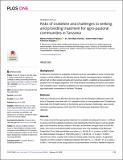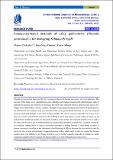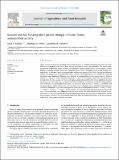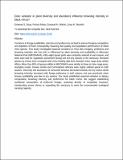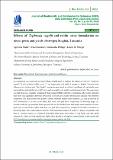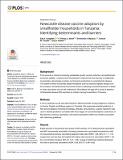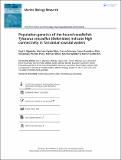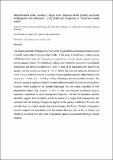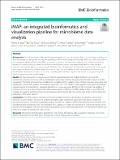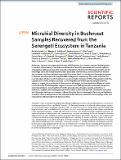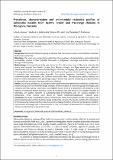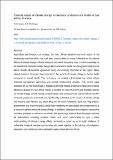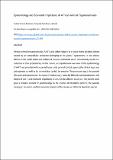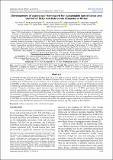Research Articles [LISBE]: Recent submissions
Now showing items 181-200 of 954
-
Risks of snakebite and challenges to seeking and providing treatment for agro-pastoral communities in Tanzania
(PLOS ONE, 2023-02-10)Continuous occurrence of snakebite incidences and the vulnerability of some communities remain a critical problem in sub-Saharan Africa. Despite causing permanent disability to almost half a million people annually and ... -
Community-based methods of using goldenberry (Physalis peruviana L.) for managing Salmonella typhi
(INNSPUB, 2022-08)Physalis peruviana has been used for the treatment of bacterial, fungal, protozoan, and viral infections. The purpose of this study was to establish knowledge, attitudes, and practices regarding the ethnobotanical value ... -
Seasons and bee foraging plant species strongly influence honey antimicrobial activity
(Elsevier, 2023-06)Honey has been used in human medicine since ancient times due to its antimicrobial properties. However, honey antimicrobial potential varies due to floral sources, geographical origins, and seasonality. The current study ... -
Does variation in plant diversity and abundance influence browsing intensity in black rhinos?
(African Journal of Ecology, 2023-03-17)Variations in forage availability, selection and preferences can lead to intense foraging competition and depletion of food consequently lowering diet quality and population performance of black rhino species. This study ... -
Effects of Tephrosia vogelii and rabbit urine formulation on insect pests and yields of cowpea Singida, Tanzania
(INNSPUB, 2022-09-20)An experiment was conducted at Jineri village, Singida rural to evaluate the effects of 10%(w/v) Tephrosia vogelii (T) and 50%(v/v) rabbit urine (U) on insect pests and yield of cowpea in Singida Tanzania from February ... -
Newcastle disease vaccine adoption by smallholder households in Tanzania: Identifying determinants and barriers
(PLOS ONE, 2018-10-24)Background Food security is critical to achieving sustainable growth, poverty reduction, and political and economic stability. Livestock have the potential to improve the food security of smallholder households in ... -
Recent rise in exploitation of Tanzanian octopuses: a policy and management challenge
(AJOL, 2022-11-29)The artisanal octopus fishery is important for the coastal communities in Tanzania. In this work the octopi landing data from the United Nations Food and Agriculture Organization (FAO), Ministry of Livestock and Fishery ... -
Population genetics of the hound needlefish Tylosurus crocodilus (Belonidae) indicate high connectivity in Tanzanian coastal waters
(Taylor & Francis, 2023-07-13). The hound needlefishTylosurus crocodilus(Belonidae) is a highly demandedfish in the localmarkets of Tanzania, but the growing coastal population threatens its sustainability. ... -
Mitochondrial DNA revealed a single stock structure of the Spotted sardinella Amblygaster sirm (Walbaum, 1792) (Teleostei; Clupeidae) in Tanzanian coastal waters
(Springer Berlin Heidelberg, 2023-06-12)The Spotted sardinella Amblygaster sirm are small pelagic fish that are important protein source to coastal communities in the Indo-West Pacific. In this study, a cytochrome c oxidase subunit 1 (COI) gene of A. sirm from ... -
Rodent abundance, diversity and community structure in a bubonic plague endemic area, northern Tanzania
(De Gruyter, 2023-08-07)Rodent-borne diseases such as bubonic plague remain a significant threat to public health in tropical countries. In plague-endemic areas, little information exists on the factors triggering periodic bursts, thus rendering ... -
Potentials of Pesticidal Plants in Enhancing Diversity of Pollinators in Cropped Fields
(Scientific Research Publishing, 2018-12-21)Declines in populations of pollinators in agricultural based landscapes have raised a concern, which could be associated with various factors such as intensive farming systems like monocropping and the use of non-selective ... -
iMAP: an integrated bioinformatics and visualization pipeline for microbiome data analysis
(BioMed Central, 2019-07-03)One of the major challenges facing investigators in the microbiome field is turning large numbers of reads generated by next-generation sequencing (NGS) platforms into biological knowledge. Effective analytical workflows ... -
Microbial Diversity in Bushmeat Samples Recovered from the Serengeti Ecosystem in Tanzania
(Nature Publishing Group UK, 2019-12-02)Bushmeat, the meat and organs derived from wildlife species, is a common source of animal protein in the diets of those living in sub-Saharan Africa and is frequently associated with zoonotic spillover of dangerous pathogens. ... -
Prevalence, characterization and antimicrobial resistance profiles of Salmonella isolates from healthy broiler and free-range chickens in Morogoro, Tanzania
(AJOL, 2022-06-13)Background: Salmonella enterica is a group of bacteria that cause enteric and systemic infection in animals and humans worldwide. Objectives: The study was conducted to determine the prevalence, characterization, and ... -
Potential Opportunities and Challenges of Deploying Next Generation Sequencing and CRISPR-Cas Systems to Support Diagnostics and Surveillance Towards Malaria Control and Elimination in Africa
(Frontiers, 2022-07-13)Recent developments in molecular biology and genomics have revolutionized biology and medicine mainly in the developed world. The application of next generation sequencing (NGS) and CRISPR-Cas tools is now poised to support ... -
Perception and Risk Factors Associated with Tuberculosis in the Manyara Region, Tanzania2
(MDPI, 2023-10-06)Tuberculosis (TB) results from infection with members of the Mycobacterium tuberculosis complex (MTBC) and represents a major global public health concern. We here sought to assess the perceptions of human and animal TB ... -
Potential impact of climate change on livestock production and health in East Africa: A review
(CIPAV Foundation, 2013-07)Agriculture and livestock are amongst the most climate sensitive economic sectors in the developing countries whilst the rural poor communities are more vulnerable to the adverse effects of climate change. Climate change ... -
Epidemiology and Economic Importance of African Animal Trypanosomiasis
(IGI Global, 2021)African animal trypanosomiasis (AAT), also called Nagana, is a vector-borne parasitic disease caused by an extracellular protozoan belonging to the genus Trypanosoma. It has serious effects on the health status and welfare ... -
Development of a practical framework for sustainable surveillance and control of ticks and tick-borne diseases in Africa
(Veterinary World, 2020-09-19)A workshop on ticks and tick-borne diseases (T&TBDs) was held on June 25 and 26, 2019, at the Tropical Pesticides Research Institute, Division of Livestock and Human Diseases Vector Control, Arusha, Tanzania. The objectives ... -
Farmers’ participatory breeding of Lablab (Lablab purpureus (L.) Sweet): A nutritional, food security and climate smart crop in northern Tanzania
(Research application summary, 2022)Farmer participatory breeding is considered an alternative technique to conventional breeding. Farmers play a major role in germplasm conservation, maintenance and selection of preferred traits especially in neglected ...

